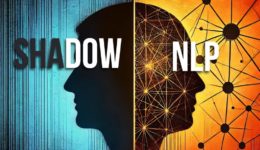Carl Jung’s Shadow Work vs. NLP: Two Paths to Personal Transformation Explained
Carl Gustav Jung’s concept of “Schattenarbeit” is most commonly translated into English as “shadow work.” This term refers to the process of exploring the “shadow,” which, in Jungian psychology, represents the unconscious aspects of the personality that an individual may not acknowledge or may even deny. These aspects often include undesirable traits, fears, and unresolved conflicts. Shadow work involves bringing these hidden parts of the psyche into consciousness, integrating them into one’s personality, and thereby achieving greater self-awareness and personal growth.
Comparing Shadow Work to NLP
1. Depth vs. Practicality:
- Shadow Work: Jung’s shadow work is deeply introspective and often involves confronting uncomfortable or repressed aspects of oneself. It is a long-term process aimed at deep psychological and spiritual transformation. The focus is on understanding and integrating these hidden aspects, which can lead to greater self-awareness, personal integrity, and wholeness.
- NLP (Neuro-Linguistic Programming): NLP, on the other hand, is much more focused on practical, immediate change. It is oriented towards improving communication, behavior, and achieving specific goals. NLP techniques are designed to be quick and effective, often working on the level of patterns, language, and behavior rather than deep psychological exploration.
2. The Unconscious Mind:
- Shadow Work: In shadow work, the unconscious mind is seen as a rich, albeit complex, source of both positive and negative traits. The process involves deep exploration of this unconscious material to integrate it with the conscious self.
- NLP: While NLP also acknowledges the unconscious mind, it approaches it differently. NLP focuses on understanding how unconscious processes influence behavior and uses techniques to reprogram these processes for better outcomes. The unconscious is often treated as a repository of patterns that can be adjusted or “reframed” for improved functionality.
3. Therapeutic vs. Goal-Oriented Approach:
- Shadow Work: Shadow work is often used in a therapeutic context, where the aim is psychological healing and integration. It’s a journey of self-discovery and healing that can be deeply transformative but is not necessarily goal-oriented in the short term.
- NLP: NLP is more goal-oriented, with a strong emphasis on achieving specific outcomes, whether in personal development, communication, or therapy. While it can be transformative, it often lacks the depth of exploration into the unconscious that shadow work entails.
What I Think About This Approach in Comparison to NLP
Both shadow work and NLP offer valuable tools for personal development, but they serve different purposes and appeal to different needs:
- Shadow Work is ideal for those who are interested in deep psychological and spiritual growth. It’s for individuals who are willing to confront their darker aspects and seek to understand themselves on a profound level. This work can be challenging and uncomfortable, but it often leads to significant long-term transformation.
- NLP is more suitable for those who are looking for practical, actionable strategies to change specific behaviors, improve communication, or achieve personal goals. It’s particularly useful in coaching, therapy, and professional development contexts where quick and effective results are desired.
In essence, shadow work is about deep, often long-term integration of the self, while NLP is about immediate and practical change. Both approaches can complement each other, with shadow work providing the deep foundational understanding of self, and NLP offering tools to enact change based on that understanding.

What does Richard Bandler think about Carl Gustav Jung?
Richard Bandler, one of the co-founders of Neuro-Linguistic Programming (NLP), has not extensively or systematically discussed Carl Gustav Jung in his public works or teachings. However, from what is available, we can infer some aspects of his perspective based on his broader approach to psychology.
- Respect for Jung’s Contributions: Bandler, along with his co-founder John Grinder, has acknowledged the influence of various psychological theories and practices, including those of Jung. While they don’t heavily focus on Jung, they do appreciate the foundational role that figures like Jung have played in the broader field of psychology.
- Focus on Practicality: Bandler’s approach in NLP is very pragmatic, emphasizing techniques that produce immediate, observable change. This contrasts somewhat with Jung’s more depth-oriented approach, which delves into the unconscious, archetypes, and long-term personal growth. While Bandler respects the contributions of Jung, he may view some of Jung’s theories as less immediately applicable in the practical, results-oriented framework that NLP espouses.
- Use of Jungian Concepts: Although not directly focused on Jung, NLP does incorporate ideas that could be seen as aligned with Jungian concepts, such as the unconscious mind, symbolism, and the impact of internal states on behavior. However, NLP typically repurposes these ideas in ways that fit its own methodologies.
In summary, while Richard Bandler respects Carl Jung as a significant figure in psychology, his own focus on practical, rapid-change techniques likely leads him to utilize Jung’s ideas selectively, adapting them to fit the more results-driven goals of NLP.
